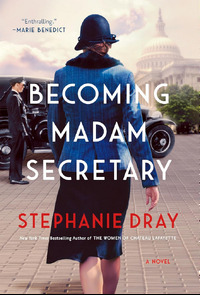 BECOMING MADAM SECRETARY |
 Fall headfirst into July’s hottest stories—danger, desire, and happily-ever-afters await. |

Purchase
Roundfire Books Romance Suspense, Literature and Fiction Excerpt of Journey Towards a Falling Sun by N. Lombardi JrPROLOGUE: NEW YORK, MARCH 23, 1984. The taxi dashed desperately into another lane, hoping to percolate through the bottleneck on First Avenue. A siren wailed somewhere behind. “Traffic’s murder today. Anytime it rains, it’s like that. Never fails.” The woman in the back of the cab put her face to the window, and focusing her eyes through streaking beads of water, stared beyond them at the black sheen of a rainwashed street. “I dunno what it is about New York drivers,” the cabbie said in a louder voice, “but every time it rains, they seem to go nuts.” Tessa Thorpe remained quiet, still gazing vacantly out the window, ignoring the driver’s comment, his words somehow lost amidst the squawk of wipers rubbing against the windshield, the hum of the engine, and the splash of tires through the puddles. The taxi pulled over to the curb. “Here we are, Belleview. Ten- fifty please.” Belleview. A name more ironic would be hard to find. Belleview. A Beautiful Sight. She paid the cabbie, got out, and slammed the door behind her, not bothering to wait for her change. Battling a pointless reluctance, she climbed the steps to the entrance door. Thorpe made her living as a psychiatrist, specifically in the field of law enforcement. Officially attached to the NYPD, her services were also at times requested by the likes of the FBI, the CIA, and in one case, Defense Intelligence. This time it was Interpol. And although she relished the challenges her profession posed, she hated the atmosphere exuded by the institutions she invariably had to work in; like this place, Belleview, although it still fared better than Creedmore. The lobby, illuminated by a sterile white neon florescence, its walls painted a pale sickly green, contained a murmuring of subdued despair. She cut quickly through the crowd in the waiting room and walked straight to the reception. “Can I help you?” a nurse asked in a nasal voice, her face full of the authority the counter between them had given her. “I have an appointment with Dr. Goldstein.” “I’ll call him. Just take a seat over there.” She headed over to one of the empty chairs by the wall and sat down, looking at the others waiting in the lobby: old people moping with solemn faces; children, oblivious of the anguish around them, playing much too loudly; and men and women, their manner and gestures betraying the discomfort associated with an unpalatable duty. Tessa herself was a bit uneasy. She didn’t like starting a case in the dark; she had never done so before and didn’t see the reason why she had to do it now. Most of her subjects were dangerous psychotics, some of them high profile, but she was told that this was not the situation here, except perhaps for the possibility that he posed a danger to himself. There was indeed some criminality in the background of this thing, but from the briefing she got, this guy was some unwitting bystander. Although it was made to appear as an act of terrorism, evidence was mounting that this was not so. In any case, she needed him to talk. Tessa liked her job, despite the fact that it practically robbed her of any semblance of a social life. And while she was certainly good- looking – bright brown eyes, thin but nevertheless inviting ruby lips, and lustrous dark brown hair (one lover referred to her as a languorous brunette) – she found the dating game tiresome. As macabre as it sounded, she enjoyed working with the criminally insane, although this guy was not a criminal, and she suspected he wasn’t insane either. “Dr. Thorpe?” She looked up at a light-haired, lab-coated doctor with a bulbous nose looming over her. “Oh, hello…Doctor Goldstein?” “Yes, that’s right. Can we go to my office?” She jumped up to follow him and on the way to the elevator she asked, “How is he? Is he coherent? I need to talk to him.” “He goes in and out. Came in what you might describe as a hysterical state, straight from the emergency ward at Columbia.” “Medication?” “Xanax, Prozac, Valium, whatever it takes to calm him.” The bell rang as the metal doors opened up in front of them. The small crowd in the elevator inhibited further conversation, and they rode up in silence to the third floor. “He’s a bit catatonic at times,” Goldstein said as they left the elevator. She walked by his side as they proceeded down a strip- lighted corridor, the walls covered with white tiles, almost like one big bathroom, but with an exaggerated smell of disinfectant. “He’s been writing something,” he added, as he opened the door to his office. “They found him in his hotel room covered with a jumble of handwritten papers, along with some other stuff.” He crossed the room to his desk by the window and pulled out a large manila envelope from one of the drawers and handed it to her. She emptied the contents of the envelope, the bulkiest item being a stack of letters bound with a rubber band, as well as the aforemen- tioned sheets of papers, many of them rendered illegible by blood stains. There were also two photographs: one with a group of African children posing with balloons, with the subject in the back row standing next to a pretty black woman who held one of the children in her arms. The other photo showed only a bunch of balloons in the sky. On the back of that photograph, someone had scrawled the word “Freedom!” Then there were the newspaper clippings, four of them: AMERICAN, TWO OTHERS, KILLED IN TURKANA DISTRICT AMERICAN FOUND ALIVE! BOMB BLAST ROCKS LONDON HOTEL – IRA SUSPECTED KENYAN GOVERNMENT RELEASES AMERICAN DETAINEE She returned the contents to the envelope, which she then stuffed inside her briefcase as they left the office. Goldstein led her down the same corridor as before and stopped at Room 304, a private room. Inside this room, a bed and a lamp-less night table were the only pieces of furniture. Sitting on the bed was a young man, knees drawn to his chest and hunched over with folded arms; his head, capped with shiny black curly hair, was cradled in his limbs as if he were exhausted. Both his wrists were heavily bandaged with gauze and cotton. “Daryl? Daryl?” Goldstein said. The slumped figure made no response. “Daryl, how are you feeling?” A standard question that was met with silence. “Dr. Thorpe has come a long way to see you. It seems you’re special.” “My medicine,” the stricken man moaned from the alcove of his groin. “Not for another…” the doctor brought his arm up to look at his wristwatch, “…hour and a half.” The patient finally lifted his head, revealing a tawny complexion. He was young, in his early thirties, and his ethnicity was an ambiguous blend of Afro-European. Fairly good-looking, except that his face was bruised and puffed up. “Self-inflicted,” Goldstein explained, seeing that Thorpe had taken note. “He gets these fits and starts hitting himself, especially when he comes down off the medication. Had to put him in restraints a few times.” “Hello, Daryl,” Tessa said. “You’re a policeman,” the subject said. “I mean woman. Policewoman. They sent one yesterday, a policeman, a man police, but I really wasn’t feeling well yesterday.” “I’m a doctor. A psychiatrist.” “I don’t feel well today either. I’ll never feel well,” he said, not listening to her. Then he motioned to her to come closer, closer, closer, so he could whisper in her ear. “I have a confession”, he confided softly. “I killed them, both of them.” It was then that Tessa slipped up, despite her eleven years at the job. She forgot to move her head away when she made her rebuttal. “No, Daryl, that’s just your guilt making you feel that way.” “DON’T YOU DARE F**KING CONTRADICT ME!” he screamed, too late for her to take her ear away in time. She covered it, and with a grimacing face, summoned her professional discipline to check her initial anger, as Goldstein placed his hands on the young man’s shoulders, fearing he might become uncontrollable. An orderly stepped into the room, in an automatic response to the screaming, which was not allowed, and stood ready to intervene. “Where’s my medication?” the young man repeated. “I told you, another...“ “Alright, don’t fucking give it to me. Let me suffer. I deserve to be tortured. I understand.” Then he went sort of glassy-eyed. “It doesn’t matter what you do, or don’t do...because the stars...the stars...they don’t sing for me anymore.” He paused to jerk his head up, looking at the ceiling, his eyes roaming in search of impercep- tible objects. “Nothing...nothing…they’re silent...” Then he went into a brief fit of uncontrollable sobbing before punching himself in the face, at which point the orderly swiftly approached to hold his arms down on the bed. The patient summarily calmed down, giving Tessa the chance to try again. “The doctor tells me you’ve been writing something,” she broke in. “What is it? Want to tell me about that?” The patient stared blankly upwards, taking his time before answering, “It’s a story,” he finally said. “What kind of story?” “A love story.” “Are you in the story?” After getting no response, she asked another question. “Do you remember the man? Did you ever see him?” Daryl Loomis just stared up. “I want him off his medication by tomorrow,” she promptly addressed Goldstein. “He’s no use to me like this.” “WHERE’S MY MEDICATION?” he suddenly screamed at the mention of the word. “And put him in restraints before I arrive,” she instructed. “Understood.” Excerpt from Journey Towards a Falling Sun by N. Lombardi Jr |
|
| |||
|
||||



 © 2003-2025
© 2003-2025